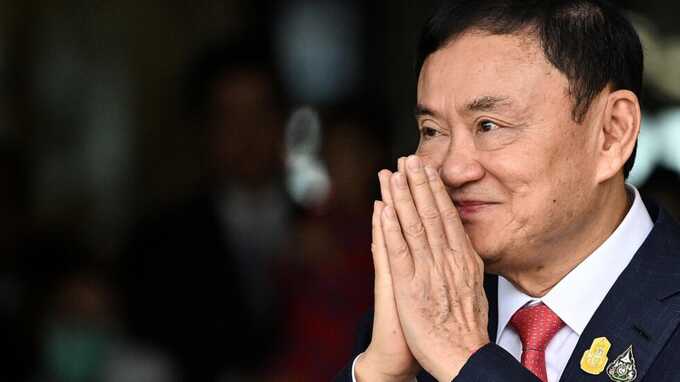
Thaksin appears in court accused of lese-majeste relating to 2015 interview with South Korean media
The former Thai prime minister Thaksin Shinawatra, a powerful backer of the ruling government, has been formally indicted for allegedly insulting the monarchy almost two decades ago.
One of Thailand’s most influential political figures, Thaksin, 74, appeared at Bangkok’s Ratchada criminal court accused of lese-majeste. The case relates to an interview he gave to South Korean media in 2015. He was granted bail on Tuesday.
Thaksin was ousted by a military coup in 2006 and spent 15 years in self-imposed exile to avoid charges he said were politically motivated. He returned to Thailand last year, arriving back in the country on the same day his party Pheu Thai formed an unlikely coalition with his former enemies from the conservative military establishment – a deal that was in both sides’ interest because it kept a popular, youthful pro-reform party out of power.
Thaksin’s indictment on Tuesday underlines the delicate nature of the current political arrangement. “I think the conservative side is trying to warn him: ‘do not cross the line’,” said Punchada Sirivunnabood, an associate professor at Mahidol University, adding that Thaksin had sought to rebuild his political power since returning to the country, including by travelling across the country.
“They want to keep the progressives out, but they have to balance the power between two sides [and ensure] Thaksin is not going to cross the line,” said Punchada.
However, it appeared unlikely Thaksin would go to prison, Punchada added. He is the only factor allowing the conservative side to keep the progressive Move Forward party out of power.
Move Forward won the most seats and votes in last year’s election, after promising major reforms, including changes to the draconian lese-majeste law. The legislation, under which Thaksin is now indicted, states that criticism of the monarchy is punishable by three to 15 years in prison on a single charge. Since youth-led protests erupted in Bangkok in 2020, 272 people have been charged under the law.
The lese-majeste case against Thaksin was not pursued previously because he was in self-imposed exile. When voluntarily returned to Thailand last year, he was immediately taken into custody on separate charges related to corruption and abuse of power. However, he did not spend a single night in prison but was instead transferred to a hospital for an undisclosed health condition. He was granted release on parole in February.

A man bows as cars in the convoy of Thailand’s former prime minister Thaksin Shinawatra leave his residence in Bangkok. Photograph: Chanakarn Laosarakham/AFP/Getty Images
Thaksin’s indictment is one of several high-profile cases involving key political players that went before the courts on Tuesday.
The constitutional court also conducted a hearing in a case lodged by a group of senators seeking the suspension from office of the prime minister, Srettha Thavisin, who is from Thaksin’s Pheu Thai party. The case relates to Srettha’s appointment of a lawyer with a conviction record to his cabinet. Srettha has said he was confident the appointment of lawyer Phichit Chuenban was legally sound and made in good faith.
The same court also heard a case seeking to disband the popular opposition Move Forward party for its campaign to amend the country’s lese-majeste law, following a complaint by the Election Commission.